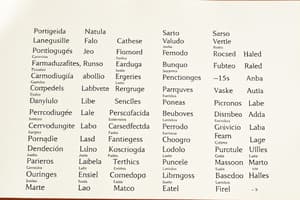Podcast
Questions and Answers
What language influenced Portuguese in terms of lexicon during the Moorish invasion of the Iberian Peninsula?
What language influenced Portuguese in terms of lexicon during the Moorish invasion of the Iberian Peninsula?
- French
- Arabic (correct)
- Italian
- German
What was the first Portuguese university created by King Diniz in 1290?
What was the first Portuguese university created by King Diniz in 1290?
- University of Lisbon
- University of Coimbra (correct)
- University of Porto
- University of Braga
Which Romance language is spoken more than Portuguese?
Which Romance language is spoken more than Portuguese?
- French
- Italian
- Spanish (correct)
- Romanian
What is the name of the period in which Portuguese literature began to appear?
What is the name of the period in which Portuguese literature began to appear?
What is the name of the standardization of the Portuguese language propelled by the development of the printing press?
What is the name of the standardization of the Portuguese language propelled by the development of the printing press?
What is the name of the vowel that Brazilian Portuguese retains in its 8-oral-vowel system, but European and African varieties innovated by creating a 9th new vowel?
What is the name of the vowel that Brazilian Portuguese retains in its 8-oral-vowel system, but European and African varieties innovated by creating a 9th new vowel?
What is the name of the process of inserting a sound to break up a sequence of vowels?
What is the name of the process of inserting a sound to break up a sequence of vowels?
What is the name of the consonant cluster that was simplified in Portuguese?
What is the name of the consonant cluster that was simplified in Portuguese?
What is the name of the phoneme that evolved as [v] in Portuguese?
What is the name of the phoneme that evolved as [v] in Portuguese?
Flashcards
Origin of Portuguese
Origin of Portuguese
Developed from Latin spoken in the Iberian Peninsula during the Roman Empire.
Galician-Portuguese Lyric Period
Galician-Portuguese Lyric Period
A period when Galician-Portuguese had its own literature, before splitting into two languages.
King Diniz's Impact
King Diniz's Impact
Formally recognized Portugal as an independent kingdom and standardized the Portuguese language.
Global Reach of Portuguese
Global Reach of Portuguese
Signup and view all the flashcards
First Portuguese Grammar
First Portuguese Grammar
Signup and view all the flashcards
Epenthesis
Epenthesis
Signup and view all the flashcards
Consonant Evolution
Consonant Evolution
Signup and view all the flashcards
Vulgar Latin Consonant Loss
Vulgar Latin Consonant Loss
Signup and view all the flashcards
Vowel Innovation
Vowel Innovation
Signup and view all the flashcards
Study Notes
Evolution of the Portuguese Language:
-
Portuguese developed from Latin spoken by Roman soldiers and colonists in the Western Iberian Peninsula starting in the 3rd century BC.
-
Old Portuguese, also known as Medieval Galician, began to diverge from other Romance languages after the fall of the Western Roman Empire and started appearing in written documents around the 9th century.
-
By the 13th century, Galician-Portuguese had its own literature and began to split into two languages.
-
Portuguese is essentially the result of an organic evolution of Vulgar Latin with some influences from other languages.
-
The arrival of the ancient Romans in 218 BC brought Latin to the Iberian Peninsula, which was spread by arriving Roman soldiers, settlers and merchants.
-
Between AD 409 and 711, Germanic tribes invaded the Iberian Peninsula, largely absorbing the Roman culture and language of the peninsula.
-
From 711, with the Moorish invasion of the Iberian Peninsula, Arabic was adopted as the administrative language in the conquered regions, influencing Portuguese in terms of lexicon.
-
The oldest surviving records containing written Galician-Portuguese are documents from the 9th century.
-
The lyric period of Portuguese began in the medieval Kingdom of Galicia and was employed by poets from throughout the non-Basque medieval Christian kingdoms of the peninsula.
-
Portugal was formally recognized as an independent kingdom in 1143 and in 1290, King Diniz created the first Portuguese university and decreed that the "Vulgar language" should be known as the "Portuguese language".
-
Portuguese is the second most spoken Romance language, behind Spanish, and has been made an official language of Mozambique, Angola, the Cape Verde Islands, Guinea-Bissau, Equatorial Guinea, Sao Tome and Principe, East Timor and Macao.
-
The standardization of the Portuguese language was propelled by the development of the printing press, with the first Portuguese grammar published in 1536 by Fernão de Oliveira.Evolution of Portuguese Phonology
-
Brazilian Portuguese retains an 8-oral-vowel system, but European and African varieties innovated by creating a 9th new vowel: /ɨ/.
-
Palatalization of voiceless stops occurred where the consonants [k] and [t] assimilated with the high vowels [e] and [i], and with the semivowel [j].
-
Consonants [l] and [n] assimilated with the semivowel [j], producing the palatals lh [ʎ] and nh [ɲ].
-
Some consonants evolved with voiceless stops becoming voiced stops and voiced stops becoming voiced fricatives in certain positions.
-
Consonant clusters, especially long (geminate) consonants, were simplified.
-
Phoneme /b/ evolved as [v].
-
The consonants [l] and [n] of Vulgar Latin were deleted between vowels, after which sometimes the vowels around them coalesced, or an epenthetic semivowel was introduced between them.
-
Medieval Galician-Portuguese, /m/ and /n/ between vowels or at the end of a syllable became the velar nasal phoneme /ŋ/.
-
The history of nasal vowels in hiatus with a previous or following vowel is complex.
-
The insertion of a sound to break up a sequence of vowels is called epenthesis.
-
The sound written ⟨v⟩ was at one point during the medieval period pronounced as a voiced bilabial fricative [β].
-
Final unstressed /a/ was subsequently raised to /ɐ/.
-
Portuguese traditionally had two alveolar rhotic consonants: a flap /ɾ/ and trill /r/.
Studying That Suits You
Use AI to generate personalized quizzes and flashcards to suit your learning preferences.





